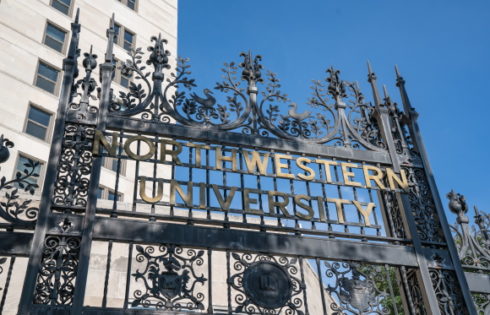
Exemptions for secular groups undermine diversity, too
The best news for the University of Iowa in court on Wednesday: Senior administrators won’t be forced to pay money for violating the constitutional rights of students.
U.S. District Judge Stephanie Rose otherwise steamrolled the taxpayer-funded university in her ruling in favor of a Christian student group that lost its school recognition because of its leadership rules on sexuality.
The university’s “human rights policy,” when applied to all registered student groups, is not the problem, Rose wrote. It’s that the university issued many exemptions to that policy for secular groups, including racial minorities and Greek life, and these exemptions undermine the administration’s rationale for issuing exemptions.
The judge didn’t just fault the university for making false statements before and during litigation. Rose said it also misstated the leadership requirements for Business Leaders in Christ until well into the litigation.
She issued a permanent injunction against the university’s enforcement of its policy against the club’s rules, “in part” because they are not “status-based” and thus do not violate university policy in the first place.
BLinC’s lawyers at the Becket law firm crowed over the ruling in a statement late Wednesday. “The university wanted a license to discriminate, and Judge Rose said no way,” Senior Counsel Eric Baxter said. The ruling is “an eloquent plea for civility in how governments treat Americans in all their diversity.”
A spokesperson for the university told The College Fix that she was “disappointed by the tenor” of Becket’s statement.
“The university never set out to discriminate against religious organizations on campus and was simply looking for guidance from the court” on what she portrayed as a “conflict” between the First Amendment and Iowa Civil Rights Act.
Becket didn’t see it that way. The law firm published a list of nearly 600 registered student organizations that the university turned over last week, showing that only religious groups were found out of compliance with the human rights policy.
The firm is representing another Christian student group, InterVarsity, that used the university’s admitted exemptions for secular groups to demand summary judgment in its own case. That lawsuit is also pending before Rose and “will likely be decided later this year,” Becket said.
‘Notable’ that university later concedes gay students can serve in BLinC
The dispute grew out of BLinC’s rejection of a leadership applicant who refused to forgo same-sex romantic relationships as a condition of serving in the group. That student filed a discrimination complaint saying he was rejected for being “openly gay.”
The Christian group claims it rejected him because “his religious views on sexual relationships conflicted with” its own, while the university agreed with the student that it was “because of his status as a gay man.” Judge Rose said the dispute was “not material” to her ruling.
William Nelson, now associate dean of students, was responsible for registering student groups at the time.
He told BLinC that it should write down its beliefs to make clear that it was requiring leadership applicants to “embrace the mission of the organization,” not judging them based on sexual orientation or another protected status covered by the human rights policy.
When the club formalized its rules in a “Statement of Faith” and “Doctrine of Personal Integrity,” it said sex should be limited to a married husband and wife, and people should embrace their “God-given sex.” Nelson said they still violated university policy. Lyn Redington, who served as dean of students at the time, affirmed Nelson’s view.
Nelson belatedly testified that BLinC could exclude applicants for disagreement with its “religious philosophy,” and Rose called it “notable” that the university eventually admitted that the club’s rules didn’t prevent gay students from serving as leaders.
But when the university did its initial review of registered student organizations a year ago – after BLinC sued – it wrongly stated that their constitutions couldn’t reject members and leaders for disagreeing with the “stated beliefs/purposes” of the groups.
It wasn’t the only incorrect statement Rose attributed to the university. Regarding a pro-LGBTQ Christian group, Love Works, that is the “ideological inverse” of BLinC, the university’s lawyers claimed it had also suspended the group’s registered status during the litigation. That is “directly contradicted” by evidence filed with the court, and the university made “no indication” of that in its briefing.
Gay Christian group can impose rules on leaders. ‘But BLinC may not.’
The judge determined that the university was subject to “strict scrutiny,” the most stringent standard of judicial review, on BLinC’s claims on free speech, expressive association and free exercise.
The human rights policy is not an “all-comers” policy, which requires all student groups to accept all “comers,” Rose said. The Supreme Court affirmed the constitutionality of a law school’s all-comers policy in 2010, ruling against the Christian Legal Society, because it was “hard to imagine a more viewpoint-neutral policy.”
The more relevant rulings to the University of Iowa’s policy come from two federal appeals courts, the judge said. The 7th Circuit ruled in 2006 that a university likely committed viewpoint discrimination when it “unevenly applied” its nondiscrimination policy to revoke the registration of the Christian Legal Society.
In 2011, the 9th Circuit remanded a case involving San Diego State University’s rejection of Christian groups because they require officers and members to Christians. This one is particularly relevant because SDSU did not take action against other groups with similarly exclusive requirements.
“Even if administrative oversight accounts for some groups’ violations of the Human Rights Policy, it does not diminish the legal significance of the fact that the University deliberately exempted other groups from the policy,” Rose wrote.
It did this even after it reviewed all constitutions a year ago, the judge continued. The policy is “facially neutral” but “not neutrally applied”:
The University allows Love Works to limit leadership to individuals who share its religious beliefs on homosexuality. But BLinC may not. It allows groups, such as [female singing group] Hawkapellas and the Chinese Students and Scholars Association, to limit leadership based on protected traits in violation of the Human Rights Policy. But BLinC may not. That is viewpoint discrimination. The University allows groups to speak about religion, homosexuality, and other protected traits through their leadership criteria; but BLinC may not express its views on these subjects.
In a footnote, Rose criticized the university for arguing that its mechanism for enforcing the policy – student complaints – does not amount to “selective application.”
It cited no authority for this claim, other authorities deem it “legally irrelevant,” and it’s also “factually irrelevant” because the university allowed many groups to keep their exemptions even after the 2018 review.
Selective exemptions endanger ‘the environment for students whose views are rejected’
The University of Iowa is making a “value judgment” by holding BLinC to standards that it won’t enforce against secular groups, Rose continued.
She cited the Supreme Court’s Lukumi precedent against a municipal law that bans “unnecessarily” killing an animal. It was applied to a religious group that slaughters animals.
The high court said the law was not neutral because it includes “individualized exemptions from a general requirement” – the justification for the killing – yet “devalues religious reasons for killing by judging them to be of lesser import than nonreligious reasons.”
The 3rd Circuit also ruled against a police department policy against beards, because it denied an exemption to Muslim officers but allowed “medical exemptions.” The 8th Circuit, which governs Rose’s court, struck down a university policy that granted “secular exemptions” for freshmen who want to live off campus, but prevented a student from living off campus in a “religious group home.”
Rose cited the university’s rationale for exempting groups such as racial minorities and Greek-letter organizations from the human rights policy, and then said its exemptions did exactly the opposite.
“Allowing student groups to restrict leadership or membership based on gender, race, or any
protected characteristic does nothing to ensure access to educational opportunities and erodes the safety of the environment for students whose status or views are rejected,” she wrote.
The judge seemed perplexed that the university never even presented “a position on strict scrutiny” in the case:
The Court sees no appreciable difference in the potential harms caused by BLinC and those caused by the various RSOs that are permitted to limit leadership or membership based on protected characteristics. Those other groups also hinder diversity and equal access to educational opportunities.
Revoking BLinC’s status was not “narrowly tailored” because the university could also “neutrally and consistently” apply its policy, or just adopt an all-comers policy, Rose said. The latter change “would dramatically promote its goals of diversity and equal access to academic opportunity.”
Constitutional issues not clearly established ‘beyond debate’
The university lucked out when it came to whether its officials who were sued individually could be liable for damages.
“This is a close call,” Rose said, seemingly arguing with herself about whether legal precedents were clear enough that university officials should have known they were infringing on BLinC’s constitutional rights.
Even though it can create the rules for a limited public forum such as registered student organizations, the university is not applying its rules in a viewpoint-neutral manner, she said. Yet Rose pointed to “elements of nondiscrimination laws and the university setting that could be viewed as complicating this case.”
The cases she previously cited “fail to offer clear conclusions as to the selective application of a nondiscrimination policy” in the context of constitutional rights. That means the constitutional issues were not clearly established “beyond debate,” so the university officials enjoy qualified immunity from monetary damages, Rose said.
BLinC also didn’t convince Rose that it enjoys a “ministerial exception” in this case. The dispute started with the gay student it rejected as a leader, yet it does not currently “arise from a live internal dispute” within the group, but rather from its dispute with the university, she said.
Rose awarded the Christian group “nominal damages as a matter of law” – a single dollar – because it established a “free speech violation” by the university.
She imposed a permanent injunction because BLinC suffered an “irreparable injury” when it lost its First Amendment freedoms, even if briefly. The university will suffer little injury, Rose said, because it already freely grants so many exemptions, and because BLinC’s policy never violated university policy in the first place.
The judge warned against “some observers” portraying the case as a “fundamental conflict between nondiscrimination laws and religious liberty.” The real conflict was the unconstitutional way the university enforced its policy.
“Particularly when free speech is involved, the uneven application of any policy risks the most exacting standard of judicial scrutiny, which Defendants have failed to withstand,” Rose wrote.
IMAGE: Elena Elisseeva/Shutterstock
Like The College Fix on Facebook / Follow us on Twitter






Please join the conversation about our stories on Facebook, Twitter, Instagram, Reddit, MeWe, Rumble, Gab, Minds and Gettr.